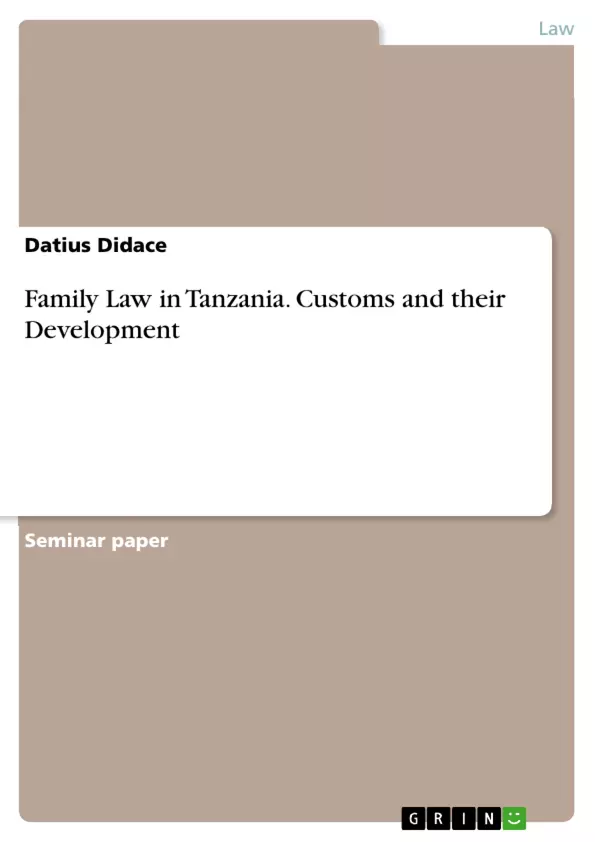This paper will discuss that in Tanzania, children born to a married woman, regardless of who their actual father is, are considered descendants of the man in whose name (bride money) was paid for the woman. The discussion will begin with a general concept of marriage and its development. The first obstacle in the treatment of voidable marriage with the help of case law. The further part of this work presents the socio-economic origin of the custom and the nature of marriage in pre-capitalism. The next part of this thesis addresses the extent to which custom represents Tanzanian law today. In addition, and in conclusion, the forces behind the changes and effects of this custom are briefly discussed.
Inhaltsverzeichnis (Table of Contents)
- 1.0 Introduction
- 1.1 General concept of marriage and its development.
- 2.0 SOCIAL-ECONOMIC ORIGIN OF THE CUSTOM
Zielsetzung und Themenschwerpunkte (Objectives and Key Themes)
This work examines the custom prevalent in many Tanzanian communities, where children born to a married woman are considered to be the offspring of the man who paid the bridewealth, regardless of their biological father. The author investigates the social-economic origins of this custom within the context of pre-capitalist societies and its significance in modern Tanzania.
- The definition and development of marriage.
- The social and economic factors influencing the origin of the custom.
- The role of bridewealth in marriage and its impact on the legal status of children.
- The continuing relevance of this custom in contemporary Tanzania.
- The forces behind changes and the impact of this custom.
Zusammenfassung der Kapitel (Chapter Summaries)
- 1.0 Introduction: This chapter introduces the subject of the work, outlining the central question of the children born to a married woman being considered the offspring of the man who paid the bridewealth. It provides a general overview of marriage and its development, emphasizing the concept of a voidable marriage and its legal implications.
- 2.0 SOCIAL-ECONOMIC ORIGIN OF THE CUSTOM: This chapter examines the social and economic context of the custom in pre-capitalist societies. It explores the origins of marriage and the role of bridewealth in determining the legal fatherhood of children. The chapter argues that this custom was deeply rooted in the economic structures of pre-capitalist societies, where children were considered a valuable source of labor.
Schlüsselwörter (Keywords)
This work delves into the complex interplay of family law, social customs, and economic realities in Tanzania. Key themes include the legal definition of marriage, the social-economic origins of customs related to marriage and child paternity, the significance of bridewealth, and the enduring impact of these customs on contemporary Tanzanian society.
Frequently Asked Questions
What is the custom regarding child paternity in Tanzania?
In many Tanzanian communities, children born to a married woman are legally considered the descendants of the man who paid the bridewealth (bride money), regardless of biological paternity.
What are the socio-economic origins of this custom?
The custom is rooted in pre-capitalist economic structures where children were valued as a source of labor, and marriage was primarily an economic and social contract between families.
How does bridewealth affect the legal status of marriage?
Bridewealth serves as a key indicator of the legitimacy of a marriage and determines the legal rights of the husband over the children born during the union.
Is this custom still relevant in modern Tanzania?
Yes, the custom continues to represent a significant part of Tanzanian customary law, though it faces challenges from modern legal reforms and changing social values.
What forces are driving changes in Tanzanian family law?
Changes are driven by socio-economic shifts, urbanization, and the influence of international human rights standards that challenge traditional views on paternity and marriage.
- Quote paper
- Datius Didace (Author), 2022, Family Law in Tanzania. Customs and their Development, Munich, GRIN Verlag, https://www.grin.com/document/1171457



